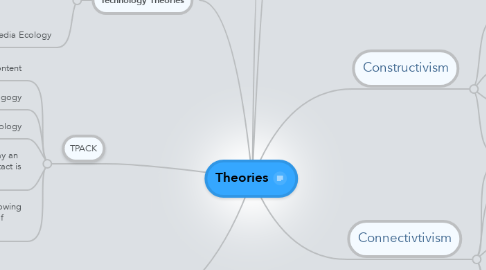Theories
by Morgan Milne

1. Technology Philosophy
1.1. What is a teachers or students philosophy of education. How do they believe it benefits the classroom/learning environment
1.2. How much value a teacher puts towards the use of technology
1.3. How much technology used in a teachers professional life. In the classroom and personal professional development
2. Technology Theories
2.1. SCOT
2.1.1. Technology=Socially constructed
2.1.2. Technology develops from human evolvment
2.2. Media Ecology
2.2.1. Technology shapes humans, where SCOT says humans affect technology
2.2.2. Technology plays a key role in the evolvement of society
3. TPACK
3.1. Content
3.2. Pedagogy
3.3. Technology
3.4. TPACK allows for technology to play an important role in ensuring that contact is presented in a pedagogical way.
3.5. Teachers are continuously growing to be better demonstrators of TPACK
4. Connectivtivism
4.1. Learning is the process of creating connections and developing a network.
4.2. knowledge is distributed across networks
4.3. Information is so accessible, so by creating networks we are better able to connect to these experts and access this information
4.4. In a classroom, you connect your students to networks/ websites/ public sites in order to understand new information
4.5. Technology examples: Google, Yahoo (search engines), Social Media, Twitter, Wikipedia.
5. Cognitive loaded
5.1. Viewing learning as a process and the function of the brain.
5.2. Taking advantage of the brains ability to develop and it develops more as you learn.
5.3. Technology examples: mind mapping, use of acronyms, story maps, prezi, powerpoint
6. Constructivism
6.1. Constructivism believes that the knowledge already exists in the brain.
6.2. The importance relies on making connections to interest bases, real world examples. It is important to connect new ideas to old concepts
6.3. Experience creates a stronger learner
6.4. Example of Technologies: Collaboration sites (google docs, word pad), blogs (Wordpress), program building programs (scratch)
7. Behaviourism
7.1. Behaviourism is the basic idea that the human brain is passive and responds to a environmental stimuli.
7.2. The mind is a blank slate and it needs to be filled with information using reinforcement
7.3. example of Technologies... Math Buster, Video games such as micro quests, iClickers, TED talks.


